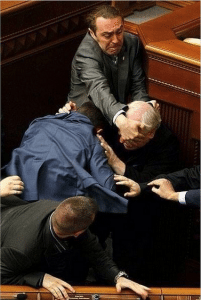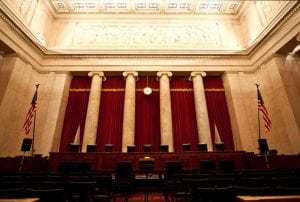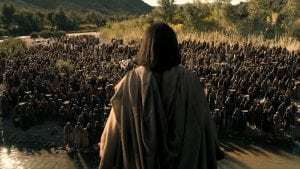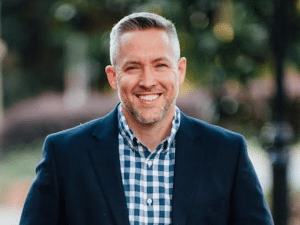Justin Taylor's Blog, page 32
August 10, 2018
Choosing a Hill to Die On (or Why Some Debates Are Worth Turning Up to Eleven)

Those who have followed my “career,” such as it is, for the last decade have surely noticed that I do not often engage in the heated theological debates of the day. There are reasons for this beyond lethargy or timidity.
I grew up and was nurtured in the Reformed tradition, where theological sparring is a spectator sport. I participated in the games, honed my wicked tongue (which was all-too-often genuinely wicked), and vanquished many foes.
I burned out.
It seemed to me (and still does) that the debates du jour formed an endless cycle of largely profitless disputation. Everything was a hill to die on, and yet we never seemed to die. No one ever “won,” yet we forgot one debate and moved on to another seamlessly. It was six-day creationism, Mosaic recapitulation, the efficacy of baptism and the “Federal Vision,” the “New Perspective on Paul,” and on and on it went. None of these matters are unimportant; but the Reformed amplifier dial has only one setting: ELEVEN.
So I turned the amplifier off.
Why, then, did I just publish a polemical essay in The Calvinist International responding to David Bentley Hart’s doctrine of the (non)resurrection of the flesh?
It was just over week ago. I had read Hart’s fascinating and dizzying article (regardless of his content, he is supremely talented), and thought that maybe somebody should write a response. It was one of those fleeting thoughts that quickly dissolves into “somebody else will do it.” I’m busy. I’m traveling this week.
On Tuesday I attended a funeral.
As I sat there with tears in my eyes looking at the handsome wooden box wherein the remains of my friend lay—after a rapid and sudden decline—a Christian brother so universally beloved the church building was bursting its capacity, the fire was rekindled. And it burned white hot.
This is not self-indulgent intellectual tiddlywinks. This is not a “hill to die on that isn’t really.” There is a man dead. And a very smug theologian of world renown has just proclaimed that the flesh and bones in that box will remain there forever.
It is a lie. A wicked one. It is a direct contradiction not only of the Word of God, but of the universal testimony of the church that has declared from ancient times, “I believe in the resurrection of the body and the life everlasting.”
This is why Christians build boxes for our flesh and bones.
This is why we plant them in the ground.
This is why we face them toward the East where the sun rises.
Because someday the Son will rise.
This one is worth ELEVEN. This is a hill worth dying on. The goodness of our Creator and the scope of his redeeming love for his creation is not a fleeting matter, to be discarded next week for another silly controversy. This debate is perennial. It is necessary. And failure on this hill is not an option.
You can read Mattson’s response here.
August 7, 2018
The Culture Wars and the Distinction between Friends and Enemies

Brad Littlejohn, President of The Davenant Institute, has an insightful post this morning on the friend/enemy distinction and how we should operate in the public square.
He begins by asking, “What does it mean for someone to be an enemy (not merely a personal enemy, but the enemy of my community in a just cause, or the enemy of the truth itself)?” He answers:
It means someone whom I am bound to oppose and resist; someone whose every weakness I must seek to discover, whose every misstep I must be alert for and ready to exploit; someone for whom I cannot afford to entertain fond feelings or show mercy, at least as long as they are an active threat.
It is someone whom I must assume is similarly seeking to exploit my weaknesses and those of my friends; someone whose intentions I must always suspect; whose action I cannot afford to give the benefit of the doubt, but must rather, as a precautionary principle, always interpret in a negative light, as an act of aggression; someone toward whom it is actually a virtue to appear paranoid.
The appropriateness of these reactions increases in proportion to the level of threat; there may be a place for rules of chivalry and gentlemanly warfare, but when I am under existential threat, facing an enemy who will stop at nothing, I cannot afford to be naïve and trusting.
He next asks, “What does it mean for someone to be my friend?”
It means someone whom I am determined to support and encourage; someone whose weaknesses I must seek to shore up and compensate for; someone whose missteps I cover for, ready to spring to their aid; someone for whom I actively cultivate an affection and whom I am quick to forgive.
It is someone of whom I try to always think the best, assuming their good intentions and applying a hermeneutic of charity when they speak or act questionably; someone for whom it is a virtue to be trusting to the point of appearing naïve.
He continues:
These radically different strategies of engagement and rules of interpretation are deeply wired into us; even while they may not be necessary for physical survival in a relatively peaceful and civilized age, they are still necessary for social, intellectual, and spiritual survival in a world filled with evil and workers of iniquity.
The friend/enemy distinction is a kind of mental mapping, a shorthand by which we make sense of the chaos around us, determining whom we can trust and how best to deploy our limited powers of empathy and of resistance.
In the intellectual realm, it enables us to simplify the vast spectrum of ideas and positions that confront us, which are beyond the power of even the brightest amongst us to dispassionately evaluate one-by-one. Without fully knowing where each individual stands on a wide range of issues, and without being able to determine where exactly the truth lies on each of those issues, we fall back on the question, “Is this person a friend or a foe?”—a question often partly answered on pre-rational grounds—to decide our posture toward them.
Littlejohn goes on to suggest that we should not necessarily abandon this framework; after all, it is unavoidable. Nor should we declare a truce or ceasefire on all “cultural wars.” But he does argue that “there is a point at which the friend/enemy distinction can do more harm than good, a point that we must be careful to guard ourselves against.”
To see his warning, along with his four strategies for sanity, you can read the whole thing here.
July 11, 2018
Why It Is Highly Unlikely That the New Supreme Court Will Overturn Roe v. Wade (Though They Should)

Conservatives have high hopes that Kavanaugh — along with Roberts, Gorsuch, Alito, and Thomas — will rule to knock over that legal monstrosity.
That’s highly unlikely.
First off, it takes four votes for the Supreme Court to agree to review a particular lower-court case, and it’s unlikely that Roberts and Kavanaugh will agree to review a straight-up challenge to Roe.
It’s far more likely that we’ll see Roberts and Kavanaugh review cases that pare away at Roe via the “undue burden” standard articulated in Planned Parenthood v. Casey (1992) — a case in which the Court held that abortion laws were tenable unless they presented an “undue burden” for a woman seeking an abortion. In Gonzalez v. Carhart (2007), for example, Justice Kennedy decided for the Court that the Partial-Birth Abortion Ban Act was constitutional, because women could get abortions prior to late-stage pregnancy, and the law therefore didn’t constitute an undue burden. We could see that logic extended incrementally over time, leaving Roe in place but carving out chunks of it.
That sort of incrementalism is less likely to whip up anger against the Court — a major concern for Roberts, at least. But it’s also more likely to leave unborn children vulnerable over time, and it leaves open the possibility that if the Court moves back to the Left, the “undue burden” loophole will be closed.
We’ll probably see a gradual shift from the Court over time that leaves more room for legislatures. . . .
That doesn’t mean Kavanaugh is bad. He’ll probably rule correctly on a consistent basis. But it does mean that those waiting for the ground to shift when it comes to major decisions from the Court might be waiting in vain. Instead, we’ll probably see a gradual shift from the Court over time that leaves more room for legislatures but doesn’t implode the unconstitutional foundations of the Left’s favorite legal bulwarks.
You can read the whole thing here.
For reminders on why Roe v. Wade is such a bad legal (not to mention moral) decision, here is Robert P. George in an interview I did with him several years ago:
The legal problem with Roe v. Wade is simple: The Supreme Court’s decision to invalidate state laws prohibiting or restricting abortion lacks any basis in the text, logic, structure, or original understanding of the Constitution of the United States. The late John Hart Ely, a famous legal scholar who himself supported legal abortion as a matter of public policy, said that Roe v. Wade “is not constitutional law and gives almost no sense of an obligation to try to be.” The justices who manufactured a right to abortion in Roe violated and dishonored the very Constitution they purported to interpret by substituting their own moral and political judgments for those of the elected representatives of the people. Their ruling was a gross usurpation by the judiciary of the authority vested by the Constitution in the people themselves, acting through the constitutionally prescribed institutions of republican democracy. As dissenting Justice Byron White put it, Roe was nothing more than an exercise of “raw judicial power.” It was not merely an incorrect decision, but an anti-constitutional one.
I would venture to say that most constitutional scholars who support legal abortion basically (if all-too-quietly) agree with Professor Ely. Roe is an embarrassingly poorly reasoned opinion. Of course, some pro-abortion scholars believe that the result in Roe could be justified by a different form of constitutional argument, and there is something of an industry among them in “re-writing Roe.” Justice Harry Blackmun, in his opinion for the Court in Roe itself, claimed that restrictions on abortion for the sake of protecting fetal life violate the provision of the 14th Amendment forbidding any state from depriving any person of “life, liberty, or property without due process of law.” Frankly, that’s ridiculous, and almost all legal scholars know that (even if some won’t say it publicly). The most notable effort to place the holding in Roe on a more plausible constitutional footing involves the claim that abortion restrictions deprive women of “the equal protection of the laws” (another 14th Amendment guarantee). There are various reasons why that approach fails, too, but many of Roe’s supporters at least find it less embarrassing.
And Clarke Forsythe told me why he think it was such a horrible decision:
It authorizes the homicide of the unborn child as national policy, a national “right.” It means abortion on demand nationwide as a practical matter, and it is an unjust, unconstitutional usurpation of the people’s right of self-government to decide the abortion issue, as the people decide other controversial issues, through the normal processes of representative government. By contrast, there is no “Roe” on other controversial bioethical issues—like human cloning, stem cell research, or assisted suicide. The Court has not taken them away from the American people; we decide these issues through the public officials we elect.
In addition to the questions of moral principle and constitutional authority, there is the question of governmental competence: the Court has demonstrated through its incompetence over the past 37 years that the American people can better decide the abortion issue than the Court.
And for women’s health, the Court created a public health vacuum—meaning that women are not informed of the medical risks, among other things, and abortion clinics are little regulated. At the very least, that vacuum should be filled by regulations enforced by local public health officials.
Law professor Michael Stokes Paulsen once wrote a remarkably helpful and concise explanation of what Roe v. Wade (especially combined with Doe v. Bolton) actually means: “The Unbearable Wrongness of Roe.”
Here are excerpts from his three critiques:
1. The Radicalism of Roe
“I suspect that if more people understood Roe‘s and Doe‘s actual holding fewer would support that constitutional regime. Roe was a truly extreme decision, creating an effectively unrestricted constitutional right to abort a living human being for any reason the mother might have, throughout pregnancy right up to the point of birth.”
2. The Legal Untenability of Roe
“[Roe] has absolutely no basis in the text, structure, or history of the Constitution. No rule or principle of law fairly traceable to the text, discernible from its structure, or fairly derived from evidence of intention or historical understanding of an authoritative decision of the people, remotely supports the result reached in Roe. In terms of fair principles of constitutional interpretation, Roe is perhaps the least defensible major constitutional decision in the Supreme Court’s history.”
3. The Immorality of Roe
“The result of Roe and Doe has been the legally authorized killing of nearly sixty million Americans since 1973. Roe v. Wade authorized unrestricted private violence against human life on an almost unimaginable scale, and did so, falsely, in the name of the Constitution.”
Professor Paulsen does not quote Augustine—or Martin Luther King’s approving quotation of the same—to the effect that “an unjust law is no law at all.” But that’s essentially what he argues:
The Court’s decision in Roe v. Wade should not be accepted as law, in any sense.
It should be resisted by legislatures and it should be refused enforcement by executive officials because it is not the law.
It should be resisted by all citizens, with all the resources at their disposal, and perhaps even with resources not (yet) at their disposal.
Anything less is holocaust denial.
Read the whole thing here.
June 21, 2018
Systemic Ignorance: A Feature, Not a Bug, of Modern Education

Patrick Deneen of the University of Notre Dame:
My students are know-nothings. They are exceedingly nice, pleasant, trustworthy, mostly honest, well-intentioned, and utterly decent. But their brains are largely empty, devoid of any substantial knowledge that might be the fruits of an education in an inheritance and a gift of a previous generation. They are the culmination of western civilization, a civilization that has forgotten nearly everything about itself, and as a result, has achieved near-perfect indifference to its own culture.
It’s difficult to gain admissions to the schools where I’ve taught—Princeton, Georgetown, and now Notre Dame. Students at these institutions have done what has been demanded of them: they are superb test-takers, they know exactly what is needed to get an A in every class (meaning that they rarely allow themselves to become passionate and invested in any one subject); they build superb resumes. They are respectful and cordial to their elders, though easy-going if crude with their peers. They respect diversity (without having the slightest clue what diversity is) and they are experts in the arts of non-judgmentalism (at least publically). They are the cream of their generation, the masters of the universe, a generation-in-waiting to run America and the world.
But ask them some basic questions about the civilization they will be inheriting, and be prepared for averted eyes and somewhat panicked looks.
Who fought in the Peloponnesian War?
Who taught Plato, and whom did Plato teach?
How did Socrates die?
Raise your hand if you have read both the Iliad and the Odyssey.
The Canterbury Tales?
Paradise Lost?
The Inferno?
Who was Saul of Tarsus?
What were the 95 theses, who wrote them, and what was their effect?
Why does the Magna Carta matter?
How and where did Thomas Becket die?
Who was Guy Fawkes, and why is there a day named after him?
What did Lincoln say in his Second Inaugural? His first Inaugural? How about his third Inaugural?
What are the Federalist Papers?
Some students, due most often to serendipitous class choices or a quirky old-fashioned teacher, might know a few of these answers. But most students have not been educated to know them. At best, they possess accidental knowledge, but otherwise are masters of systematic ignorance. It is not their “fault” for pervasive ignorance of western and American history, civilization, politics, art and literature. They have learned exactly what we have asked of them—to be like mayflies, alive by happenstance in a fleeting present.
Augustine’s ‘Confessions’ as Anti-Autobiography

What type of literature is Augustine’s Confessions? Most of us would be tempted to call it an autobiography in the form of an extended prayer.
But in a brilliant essay on Book One of the Confessions, Charles Mathewes, Carolyn M. Barbour professor of religious studies at the University of Virginia, argues, “Not only do our expectations of autobiography as a genre mislead us about Augustine’s aims in the Confessions; they positively obstruct our apprehension of its purposes.”
The problem beneath our urge to autobiography, he argues, it “our presumption of beginning.” And Mathewes argues that throughout his work, Augustine is targeting this very presumption:
He takes as his task not so much to help us directly to escape from the tendency to narrate ourselves . . . , but rather to tell a story that is ultimately legible only from the perspective of salvation, from the perspective of one whose understanding has been redeemed from the ceaselessly futile task of trying to tell one’s own story. In doing so, he urges on the reader’s reconsideration of not just the propriety, but the very possibility of imagining that one can tell one’s story from within it. The Confessions is the story of a life, but it is a life still in via, and until death or (better and more appropriately) the eschatological consummation of that life, its meaning remains, for us and for Augustine, unknown. The work is not in fact merely not autobiographical, it is properly speaking anti-autobiographical. Yet this, Augustine seems to be saying, is what any true “autobiography” should be: it is the story of a life from the inside, and from the insider, our lives are not yet narratable.
The aim of this anti-autobiography is pedagogical and psychological: it wants not directly to reshape our dispositions (it has no hope that a text alone can do that; such is the work of God alone), but rather to vex our comprehension until those dispositions begin to be reshaped. Rather than seeking to comprehend our lives better, Augustine hopes his readers will more appropriately fail to comprehend them; and insofar as one fails to comprehend in the right way, one is blocked from understanding the deep character of what the Confessions is all about. This is a crucial exegetical fact about the Confessions, though one rarely noticed.
Both positively and negatively, Mathewes argues, Augustine wants us to see our lives as much less intelligible than we usually think they are:
Negatively, we are to come to see the absolute unintelligibility of our sinful lives as sinful: we must unlearn the false explanations we give of our corruption, and we must come to be shocked that we are as corrupted, as messed up, as we are—and we must come to be humbled and mournful about it.
Positively, we should be bewildered by the sheer gratuitousness of our bare existence, by cultivating our recognition of our inability to explain our existence as “merited” by anything self: we must unlearn the false explanations our existence, the stories we tell ourselves about how we got to be the way we are, and see our lives instead as a great gift to us, wholly unmerited by anything we have or could have done—and we must come to wonder in gratitude at the sheer gift of our existence. In undertaking this quest for greater self-understanding, we discover that instead we gain a deepened incomprehension of our lives.
Mathewes notes that two things follow from this:
First, in terms of genre, the Confessions may be the least apologetic text Augustine ever wrote, despite all those who try to read their way to faith through it; it is not meant for those outside of the church, but for those inside, to help them in their quest to become more fully Christians.
Second, we can properly read the Confession only if we fully accept the eschatological dimensions of human understanding; we must accept that our “beginnings” will only be comprehensible (insofar as they will be comprehensible) from the perspective of the end, and that therefore much more of our lives as currently lived must seem to us to be mysterious. Our lives are not our own, and not yet even fully given to us; we will be given to ourselves only eschatologically.
Mathewes shows that Augustine is trying to reorient and recalibrate our inclinations away from self-orientation:
. . . We begin to reconceive our lives not so much as self-starting, but as “being begun,” and begun by another—namely, God. The crucial move in the Confessions . . . is to resist our presumption that we are our own beginnings. One may understand the work as the story of Augustine growing in the knowledge of that presumptuousness, and as the story of Augustine finally surrendering his sinful desire to be his own author. It is by trying to be “the beginning” that we sin; such is the lesson of the fall of the rebel angels. We must learn to see our lives, and the actions that constitute them, as reducible, without remainder, to response.
The entire essays is worth reading: Charles T. Mathewes, “Book One: The Presumptuousness of Autobiography and the Paradoxes of Beginning,” in A Reader’s Companion to Augustine’s Confessions, ed. Kim Paffenroth and Robert P. Kennedy (Louisville/London: Westminster John Knox Press, 2003), 7–23 (8–9 quoted above).
June 14, 2018
The Heart of a Bible Commentator

Charles Quarles, Sermon on the Mount: Restoring Christ’s Message to the Modern Church (Nashville: B&H, 2011), xiv–xv:
Writing this commentary has been a life-changing experience. Due to other writing projects and some health challenges, I have worked on this commentary off and on for the past six years. During this time I have been privileged to live with the Savior on the mountain pondering His precious teaching until I heard His voice and, I believe, felt His heart.
Throughout the process of writing this commentary, I have sought to heed the admonition of J. A. Bengel:
“Te totum applica ad textum; rem totam applica ad te”
(“Apply yourself totally to the text; apply the text totally to yourself”).
The first prescribed exercise has often been enlightening, and I have seen and understood important elements of the text in new ways.
The second prescribed exercise has led me to see myself in new ways.
I have been encouraged by Jesus’ promises, indicted by His rebukes, stirred by His challenges, and strengthened by His presence.
I have learned the importance of seeking to live in accord with God’s character and not merely His commands.
I have aspired for holiness as a participant in the new exodus, a recipient of new creation, and a beneficiary of the new covenant.
Jesus’ words have caused my stomach to grumble with new hunger for righteousness and have parched my throat with new thirst for Christlikeness.
My prayer is that this commentary will help lead each reader to a similar experience. I sincerely hope that you will hear and respond to Jesus’ teaching like a true disciple rather than like the crowds who were impressed by Jesus’ authority but who ignored His instructions.
As you study Christ’s message, I urge you to consider whether you will be recognized as a true “son of God” whose character resembles that of the heavenly Father on the great day of judgment or dismissed as a hypocrite with the fateful words, “I never knew you.”
Relief is still available to the beggarly in spirit who humble themselves before Christ.
Ask and the gift of salvation will be given to you.
Seek the kingdom and you will find it.
Knock at its gates and a gracious Savior will open them for you.
I covet each reader’s prayer for my own growth in godliness. For I recognize that if my life is not as apt a commentary on Jesus’ sermon as this book, I have failed to hear the true voice of the Teacher on the mountain and this book is an expression of the hypocrisy that Jesus so despised. May Christ grant to us a righteousness that surpasses that of the scribes and Pharisees and mirrors that of the Father’s own heart.
June 13, 2018
Augustine’s Grid: Act as You Desire, So Long as You Act with Love

More than once, Augustine wrote, Ama et quod vis fac: “Act as you desire, so long as you act with love.”
Garry Wills writes: “Some take this to mean that a profession of love frees one from constraint. But for Augustine love is the constraint.”
Here is Augustine in his Commentary on Paul’s Letter to the Galatians (57):
We should never undertake the task of chiding another’s sin unless, cross-examining our own conscience, we can assure ourselves, before God, that we are acting from love.
If reproaches or threats or injuries, voiced by the one you are calling to account, have wounded your spirit, then, for that person to be healed by you, you must not speak till you are healed yourself, lest you act from worldly motives, to hurt, and make your tongue a sinful weapon against evil, returning wrong for wrong, curse for curse.
Whatever you speak out of a wounded spirit is the wrath of an avenger, not the love of an instructor.
Act as you desire, so long as you are acting with love.
Then there will be no meanness in what may sound mean, while you are acutely aware that you are striving with the sword of God’s word to free another from the grip of sin.
And if, as often happens, you begin some course of action from love, and are proceeding with it in love, but a different feeling insinuates itself because you are resisted, deflecting you from reproach of a man’s sin and making you attack the man himself—it were best, while watering the dust with your tears, to remember that we have no right to crow over another’s sin, since we sin in the very reproach of sin if anger at sin is better at making us sinners than mercy is at making us kind.
And here he is in a sermon on the first letter of John (JL 7.8):
Because of varying circumstances, we see one man looking harsh because he loves and another looking pleasant because of vice.
The father gives a son blows, the whoremonger gives blandishments.
Consider them in themselves, blows or blandishments—who wouldn’t take the blandishments and duck the blows?
But look at the motives—they are the blows of love, the blandishments of vice.
You see my point, that human acts should be judged by their basis in love.
Many things have a surface appearance of good, but are not based in love—like blossoms on a thorn plant.
Other things look hard, look forbidding, but they instill a discipline informed by love.
Once again, to put it simply: act as you desire, so long as you act with love.
If you are silent, be silent from love.
If you accuse, accuse from love.
If you correct, correct from love.
If you spare, spare from love.
Let love be rooted deep in you, and only good can grow from it.
June 12, 2018
A Conversation with J. D. Greear, the New President of the Southern Baptist Convention

This afternoon the Southern Baptist Convention—the largest Protestant body in the United States and the largest Baptist denomination in the world—elected 45-year-old pastor J. D. Greear as its 62nd president, the youngest man to hold the office in 38 years.
Two years ago, Greear voluntarily withdrew from a closely contested election with Steve Gaines in order to unite the denomination.
Some quick background on the office of president in the world’s largest Baptist denomination and the largest Protestant denomination in the United States:
The first president of the Southern Baptist Convention was elected in 1845.
The term of the presidency is one year.
Beginning in the 20th century, the SBC president was allowed to serve a maximum of two terms.
And here is some background on Greear:
In the year 2000, Greear became the college pastor at Homestead Heights Baptist Church in Durham, North Carolina, which had about 300 regular attenders at the time.
In 2002, the church called Greear to be their senior pastor, and it was renamed The Summit Church, serving Raleigh-Durham, North Carolina.
Under Greear’s pastoral leadership the Summit has become a multi-site megachurch with nearly 10,000 people attending 11 locations.
The church seeks be known by its (1) gospel focus and (2) sending culture.
Over the past 15 years they have sent more than 1,000 people to be on church-planting teams, both here and abroad.
They have a goal of planting 1,000 new churches by the year 2050. The Summit Church seeks to be known by its gospel focus and sending culture.
Greear has authored several books, including:
The Islam Code: Understanding the Soul Questions of Every Muslim (2010)
Gospel: Recovering the Power That Made Christianity Revolutionary (2011)
Stop Asking Jesus into Your Heart: How to Know for Sure You Are Saved (2013)
Jesus, Continued . . . : Why the Spirit Inside You Is Better Than Jesus Beside You (2014)
Gaining by Losing: Why the Future Belongs to Churches That Send (2015)
You Don’t Get Your Own Personal Jesus (2018)
Not God Enough: Why Your Small God Leads to Big Problems (2018)
Greear did his PhD in theology at Southeastern Baptist Theological Seminary (where he also teaches), writing on the correlation between presentations of the gospel in the early church and the theology of Islam. He has a heart for Muslims to come and know the saving gospel of the Lord Jesus Christ, having lived and served among Muslims.
Greear and his wife, Veronica, live in Raleigh and have four children.
What is the biggest need of the hour in the SBC?
Re-establishing the gospel above all else as the foundation of our unity and focus of our mission.
The apostle Paul said that the gospel is “of first importance” (1 Corinthians 15:3–4). If we are going to move forward in unity, we have got to keep the gospel at the center of all we do. The gospel must be greater than our programs, greater than our political agendas, and greater than any petty difference that threatens to divide us.
We also need a shift in our culture. Our mission and our doctrine are rock solid. But recent events have shown that our culture has grown too comfortable with power and the dangers that power brings. We need to move forward on our knees—demonstrating confession, encouraging transparency, and modeling humility. God has been chastening the SBC, and that process is painful. But I believe that God is cleaning house in order to purify us for greater effectiveness for his mission.
Obviously the question of how churches should handle cases of abuse has been much discussed in recent days. How would you like to see churches deal with abuse going forward?
It is a tragedy when anyone endures abuse. It is particularly tragic how common it is today, and it is a scandal that abuse has often flourished in church environments. The church should be a place where the abused and the vulnerable find a safe haven. At the Summit, we are doing everything we can to ensure that both our culture and our processes really do protect the vulnerable.
This includes recognizing the difference between what is only immoral and what is both immoral and illegal. Jesus forgives both, but God gives primary jurisdiction over what is immoral to the church (Matthew 18) and jurisdiction over what is illegal to the state (Romans 13). We honor God and his Word when we recognize this and bring the appropriate authorities in, without apology and without delay.
Physical or sexual abuse can never be tolerated, minimized, hidden, or “handled internally.” Those in leadership who turn a blind eye toward abuse are complicit with it and must be held accountable. The women in our churches deserve better.
Are there ways in which you think the SBC needs to rethink the way in which women are utilized in gospel ministry?
The recent focus on raising up women in ministry has been a good one, and one that we in the complementarian camp should welcome. I affirm, without reservation, the complementarian view of gender found in Scripture—that women are equal in essence, equal in value, and equal in spiritual giftings, while not being equivalent to men. Women and men are created differently and serve distinct roles in the family and in the church, where (for instance) only men can serve in the office of pastor. Complementarianism is not a box to be checked, but a beautiful truth to be celebrated.
But this complementarian position should not lead us, as it has led some, to stifle the leadership possibilities and ministry avenues for women. The rich teaching of Scripture about the complementary roles of women and men has never meant, “All women everywhere should submit to men everywhere.” Nor does Scripture anywhere imply that women cannot exercise robust spiritual and leadership gifts in the church.
Sometimes, in our rightful espousal of complementarianism, we in the SBC have failed to create the same pathways into ministry for women that we have for men. This was true at the church that I pastor: it was easy for men to get trained and step into leadership, but not women. Our ministry team was very, very male-heavy, as we tended to consider only men even for positions of leadership that really did not require occupation by an ordained pastor/elder.
I hope to see complementarians recognize that far from preventing women from exercising our gifts, our theology propels us to equip, encourage, and empower women to unleash their gifts for the church.
I know one of the things that drives you is the conviction that theology and mission should be deeply grounded in the gospel. Can you explain what you mean?
God has raised up many to remind us that the gospel is not simply the “entry rite” into Christianity, but the fountain of our growth and focus of our mission.
The gospel is the good news that Jesus died in our place to restore us to God, and offers us abundant life in him through his resurrection. It needs to be declared to every person on earth. Jesus summarized his mission as “seeking and saving the lost,” and said he had more joy over finding the one sinner who repents than anything happening in the 99 who were already his.
The gospel should saturate every stage of the Christian life. The gospel that saves the sinner also makes the saint come alive. We grow in Christ not by going beyond the gospel, but deeper into it. Or, as a friend of mine says, “The fire to do in the Christian life comes from being soaked in the fuel of what has been done.”
How do you see the relationship between grace and truth?
The apostle John summarized Jesus’s ministry in one phrase: “full of grace and truth” (John 1:17). To minister to our culture like Jesus, we must aim for that same balance.
Truth without grace is fundamentalism; grace without truth is liberalism.
The combination of grace and truth made Jesus irresistibly attractive to people of all kinds, and will make us so as well. Of course, Jesus also made people so mad that some wanted to kill him. When we carry ourselves with grace and truth, we will find our culture reacting to us like they reacted to Jesus.
Practically speaking, this means our preaching of the gospel must be accompanied by acts of extravagant gospel generosity. As Francis Schaeffer explained, love on display in the church is God’s final apologetic to the world.
Can you tell us what you guys have done at The Summit Church to increase ethnic diversity and why this is so important to you?
Our efforts at The Summit Church along this line are guided by the plumb line, “The church should reflect the diversity of its community and declare the diversity of the kingdom.” Unity across race and ethnicity is one of the hallmarks of the gospel, a sign to the world that the gospel has real power (Ephesians 2).
Our congregations should bespeak a unity that goes beyond a shared cultural and religious heritage. It should point to a divine unity, established by
our common problem, sin;
our common hope, salvation; and
our common life, the Spirit.
Furthermore, our unity is to be a sign, preview, and firstfruits of the coming kingdom, in which every tribe, tongue, language, and nation will gather around Christ’s throne in all their resplendent cultural distinctives (Rev. 5).
Our journey toward this goal hasn’t been easy—true diversification never is. But we’ve learned that diversity isn’t a niche “project” for a select few; rather, it is an essential part of discipleship, and the responsibility of every follower of Jesus.
For those of us in the majority culture, this process has begun with a posture of listening, not talking. The definition of a blind spot, after all, is a weakness that we don’t know that we have. Historically, the most insidious blind spots result from positions of privilege and power. If we are serious about discovering these blind spots, it means committing ourselves to uncomfortable conversations where we seek more to understand that we do to be understood.
Not only will we find the experience of listening uncomfortable, we will also likely find that some of the changes necessary to reflect the diversity of the body of Christ are uncomfortable, too. If we want the SBC to be a homogenous, conservative, white Anglo-Saxon movement, then cultural hegemony is fine. But if we want to reach the diversity of communities throughout the United States, then we better get ready to see our cultural and leadership structures change.
God has, by his grace, given us real progress in this area. Nearly 20 percent of our church attenders are non-white (up from less than 5 percent less than a decade ago). At least a third of our campus pastors and worship leaders are non-white. Our church still has a long way to go, but we are proof that moving toward diversity is possible.
How could you see this playing out in the wider SBC?
For the SBC, the road forward may be difficult, but it’s not impossible. More than 21 percent of Southern Baptists are non-white. Let that sink in—and praise God for it!
The numbers, in fact, align rather closely to the national census statistics.
The U.S. population is
12% African-American
16% Latino, and
4.7% Asian.
The number of Southern Baptists in these demographics is similar:
7.4% African American,
6.7% Latino, and
3.9% Asian.
A quick glance reveals that while we aren’t perfectly reflecting our nation, we’re in the ballpark. And we’re much closer than the mainline denominations, which are nearly all white. We are, contrary to many expectations, a rather diverse convention.
The real work for us going forward is to bring our leadership into alignment with where our people are. Nearly a fifth of our churchgoers are black, Latino, or Asian, but our leadership still falls far short of that mark. The leaders are there, and we all stand to benefit from the treasures they bring the convention. But we’ve got to give them the platform to do it.
Why is “missions” so important for Southern Baptists, and are your hopes for the future of mission and the SBC?
Missions is at the heart of who we are because it is first at the heart of God.
One of the key truths we repeat often at the Summit is that sending capacity in the local church is more important than seating capacity. All of Jesus’s promises about the greatness of the church are not about a large group of people gathering to bask in the anointing on one leader but multiple leaders being raised up and sent out in the power of the Spirit. Our God is a sending God. He sent his best into the world to save us. Jesus is referred to as “sent” 44 times in the New Testament. After his resurrection, Jesus passed his identity on to his disciples: “As the Father has sent me, I am sending you” (John 20:21). To follow Jesus is to be sent and to devote yourself to sending.
We also know that the reason God blesses a people is to make them a blessing to the nations. The basis of the psalmist’s prayer for revival in Psalm 67 is that God would use his people to make his salvation known among all nations. God never pours his Spirit into people to make them into gospel reservoirs; he turns his people into rivers that flood the nations. If we want the awakening of the Spirit, we have to be devoted to the nations (John 12:26).
I truly believe that the greatest movement of God in the SBC lies not in our past, but in our future. Throughout Scripture, we see that “past graces” are evidences that God wants to bestow future graces. There can be no doubt that the SBC experienced some unusual grace in the Conservative Resurgence. Why would the Holy Spirit have done that if it were not to give us an unprecedented effectiveness among the nations? God does what he does not to preserve institutions, but for the sake of the Great Commission. It’s all about the Great Commission. That means the best days of the SBC are ahead us. They have to be! There are still more than 6,000 unreached people groups in the world, and history cannot end until they have been given a gospel witness. It is our moment to expect great things of God, and then attempt great things for God.
What would it look like if every Southern Baptist church committed to help in the planting or revitalizing of just one domestic church next year? And what if every one of our churches got involved reaching one unreached or underserved people group overseas? Truly, the gates of hell would not stand a chance.
How can we pray for you personally in the days and weeks and months ahead?
I am first a husband and father, and second a local church pastor. These have been and will remain my primary assignments.
Please pray that God gives all of us—my family, our church, and the denomination—grace for the future.
Pray that my kids grow up to love Jesus and the sheep.
Pray for wisdom for me. Even those of us appointed to be shepherds are still sheep, which means we need to lean on him to make our paths straight and not trust in our ability to understand. We need to cast ourselves on the mercy of the One who laid down his life for us and promised the success of the church in every generation, world without end (Eph. 3:20-21).
Here is an example of Greear preaching on the grandeur of God from Job 38–42:
June 11, 2018
How Every Theologian Should Talk to His Readers

Augustine, On the Trinity 1.5 [my italics].
Let me ask of my reader,
wherever, alike with myself, he is certain, there to go on with me;
wherever, alike with myself, he hesitates, there to join with me in inquiring;
wherever he recognizes himself to be in error, there to return to me;
wherever he recognizes me to be so, there to call me back: so that we may enter together upon the path of charity, and advance towards Him of whom it is said, Seek His face evermore.
And I would make this pious and safe agreement, in the presence of our Lord God, with all who read my writings, as well in all other cases as, above all, in the case of those which inquire into the unity of the Trinity, of the Father and the Son and the Holy Spirit; because in no other subject is error more dangerous, or inquiry more laborious, or the discovery of truth more profitable.
If, then, any reader shall say, This is not well said, because I do not understand it; such an one finds fault with my language, not with my faith: and it might perhaps in very truth have been put more clearly; yet no man ever so spoke as to be understood in all things by all men.
Let him, therefore, who finds this fault with my discourse, see whether he can understand other men who have handled similar subjects and questions, when he does not understand me: and if he can, let him put down my book, or even, if he pleases, throw it away; and let him spend labor and time rather on those whom he understands.
Yet let him not think on that account that I ought to have been silent, because I have not been able to express myself so smoothly and clearly to him as those do whom he understands. For neither do all things, which all men have written, come into the hands of all. And possibly some, who are capable of understanding even these our writings, may not find those more lucid works, and may meet with ours only.
And therefore it is useful that many persons should write many books, differing in style but not in faith, concerning even the same questions, that the matter itself may reach the greatest number — some in one way, some in another.
But if he who complains that he has not understood these things has never been able to comprehend any careful and exact reasonings at all upon such subjects, let him in that case deal with himself by resolution and study, that he may know better; not with me by quarrellings and wranglings, that I may hold my peace.
Let him, again, who says, when he reads my book, Certainly I understand what is said, but it is not true, assert, if he pleases, his own opinion, and refute mine if he is able. And if he do this with charity and truth, and take the pains to make it known to me (if I am still alive), I shall then receive the most abundant fruit of this my labor. And if he cannot inform myself, most willing and glad should I be that he should inform those whom he can.
Yet, for my part, I meditate in the law of the Lord, if not day and night, at least such short times as I can; and I commit my meditations to writing, lest they should escape me through forgetfulness; hoping by the mercy of God that He will make me hold steadfastly all truths of which I feel certain; but if in anything I be otherwise minded, that He will himself reveal even this to me, whether through secret inspiration and admonition, or through His own plain utterances, or through the reasonings of my brethren. This I pray for, and this my trust and desire I commit to Him, who is sufficiently able to keep those things which He has given me, and to render those which He has promised.
May 30, 2018
How Donald Trump Ushered in the Apocalypse

Ross Douthat:
Among Trump-supporting religious believers, the long odds he overcame to win the presidency are often interpreted as a providential sign: Only God could have put Donald Trump in the White House, which means he must be there for some high and holy purpose.
The trouble with this theory is that it’s way too simplistic about what kind of surprises an interventionist deity might have in mind. Such a God might, for instance, offer political success as a temptation rather than a reward — or use an unexpected presidency not to save Americans but to chastise them.
We’re a long way from any final judgment on God’s purposes in the Trump era. But so far the Trump presidency has clearly been a kind of apocalypse — not (yet) in the “world-historical calamity” sense of the word, but in the original Greek meaning: an unveiling, an uncovering, an exposure of truths that had heretofore been hidden.
That exposure came first for the Republican Party’s establishment, who were revealed as something uncomfortably close to liberal caricature in their mix of weakness, cynicism and power worship.
It came next for the technocrats and the data nerds of the Democratic Party, who were revealed as ineffectual, clueless and self-regarding in opposing Trump’s clown-car campaign.
And then it came for a range of celebrated media men, from Harvey Weinstein to Matt Lauer, who found that in the backlash against Trump’s misogyny their own sins were suddenly exposed.
But the unveiling has not been confined, as Trump’s providentialist supporters might like to imagine, to institutions and individuals that have arrayed themselves against him.
It has come as well for figures whose style anticipated him (Roger Ailes, Bill O’Reilly, that whole ménage) and for figures who have deliberately attached themselves to his populist revolt. The sins of Roy Moore were more exposed by the Trump era, and now likewise the racist paranoia of Roseanne Barr.
And lately a similar moral exposure has come to precisely the sector of American Christianity where support for Donald Trump ran strongest — the denominational heart of conservative evangelicalism, the Southern Baptist Convention.
Read the whole thing here.
Justin Taylor's Blog
- Justin Taylor's profile
- 44 followers



